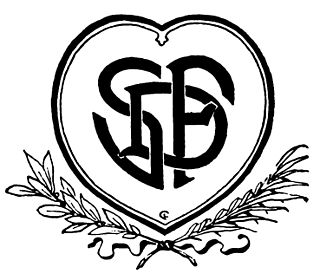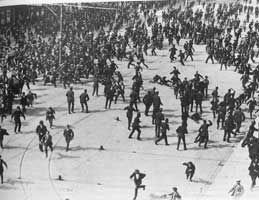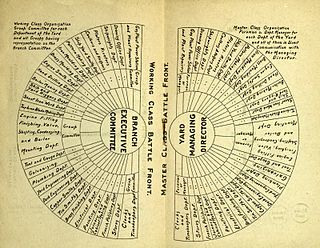The Industrial Syndicalist Education League (ISEL) was a British syndicalist organisation which existed from 1910 to 1913.
In May 1910 Guy Bowman and Tom Mann, two dissident members of the Social Democratic Federation (SDF) travelled to France visiting members of the syndicalist General Confederation of Labour. Mann returned convinced of their doctrine. He started the monthly newspaper The Industrial Syndicalist in July. He went on to establish contacts with leading syndicalists in the United Kingdom like Peter Larkin and James Larkin, and other dissidents in the Independent Labour Party, the SDF, and the Clarion movement.

Thomas Mann was a noted British trade unionist. Largely self-educated, Mann became a successful organiser and a popular public speaker in the labour movement.

The Social Democratic Federation (SDF) was established as Britain's first organised socialist political party by H. M. Hyndman, and had its first meeting on 7 June 1881. Those joining the SDF included William Morris, George Lansbury, James Connolly and Eleanor Marx. However, Friedrich Engels, Karl Marx's long-term collaborator, refused to support Hyndman's venture. Many of its early leading members had previously been active in the Manhood Suffrage League.

The General Confederation of Labour is a national trade union center, the first of the five major French confederations of trade unions.
In November 1910 the ISEL was founded at two-day conference in Manchester, allegedly attended by 200 delegates representing 60,000 workers. The ISEL became the first British fully syndicalist organisation, and the largest ever. It was not a trade union, but rather sought to disseminate syndicalist ideas within the labour movement. The ISEL did not have a formal organisational structure or membership. It did not consider the conditions to be ripe to start a mass organisation, thus it consisted mainly of Mann and a few of his confidants. It gained the support of E. J. B. Allen, associated with the Industrialist League. It published a monthly newspaper The Syndicalist, which claimed a circulation of 20,000.

Manchester is a city and metropolitan borough in Greater Manchester, England, with a population of 545,500 as of 2017. It lies within the United Kingdom's second-most populous built-up area, with a population of 3.2 million. It is fringed by the Cheshire Plain to the south, the Pennines to the north and east, and an arc of towns with which it forms a continuous conurbation. The local authority is Manchester City Council.
The period from 1910 to 1914 was marked by labour unrest including the 1911 Liverpool general transport strike and the Dublin lock-out. Tom Mann was the head of the strike committee of the former, which did not allow any transportation in the city without its permission. The ISEL also had close contact to coal miners in South Wales.
The 1911 Liverpool general transport strike, also known as the great transport workers' strike, involved dockers, railway workers and sailors, as well people from other trades. It paralysed Liverpool commerce for most of the summer of 1911. It also transformed trade unionism on Merseyside. For the first time, general trade unions were able to establish themselves on a permanent footing and become genuine mass organisations of the working class.

The Dublin lock-out was a major industrial dispute between approximately 20,000 workers and 300 employers which took place in Ireland's capital city of Dublin. The dispute lasted from 26 August 1913 to 18 January 1914, and is often viewed as the most severe and significant industrial dispute in Irish history. Central to the dispute was the workers' right to unionise.
In November 1912, the ISEL held a two conferences with a claimed attendance of 235 delegates representing 100,000 workers. That winter, the organisation began setting up branches and drawing up a constitution.

A constitution is an aggregate of fundamental principles or established precedents that constitute the legal basis of a polity, organisation or other type of entity, and commonly determine how that entity is to be governed.
In September 1913, the ISEL hosted the First International Syndicalist Congress at Holborn Town Hall in London, where syndicalists from all over Europe and South America convened. The same year also saw the ISEL collapse. The period of unrest that had been significant for the development of British syndicalism was coming to an end. Bowman, an important theoretician in the group, turned to the Industrial Workers of the World, winning the ISEL to a dual unionist position. Those in the group opposed to this line left to form the Industrial Democracy League, and the ISEL dissolved soon after.

The First International Syndicalist Congress was a meeting of European and Latin American syndicalist organizations at Holborn Town Hall in London from September 27 to October 2, 1913. Upon a proposal by the Dutch National Labor Secretariat (NAS) and the British Industrial Syndicalist Education League (ISEL), most European syndicalist groups, both trade unions and advocacy groups, agreed to congregate at a meeting in London. The only exception was the biggest syndicalist organization worldwide, the French General Confederation of Labor (CGT). Nevertheless, the congress was held with organizations from twelve countries participating. It was marked by heated debate and constant disagreements over both tactics and principles. Yet, it succeeded in creating the International Syndicalist Information Bureau as a vehicle of exchange and solidarity between the various organizations and the Bulletin international du mouvement syndicaliste as a means of communication. It would be viewed as a success by almost all who participated.

The Industrial Workers of the World (IWW), members of which are commonly termed "Wobblies", is an international labor union that was founded in 1905 in Chicago, Illinois, in the United States. The union combines general unionism with industrial unionism, as it is a general union whose members are further organized within the industry of their employment. The philosophy and tactics of the IWW are described as "revolutionary industrial unionism", with ties to both socialist and anarchist labor movements.
Dual unionism is the development of a union or political organization parallel to and within an existing labor union. In some cases, the term may refer to the situation where two unions claim the right to organize the same workers.








